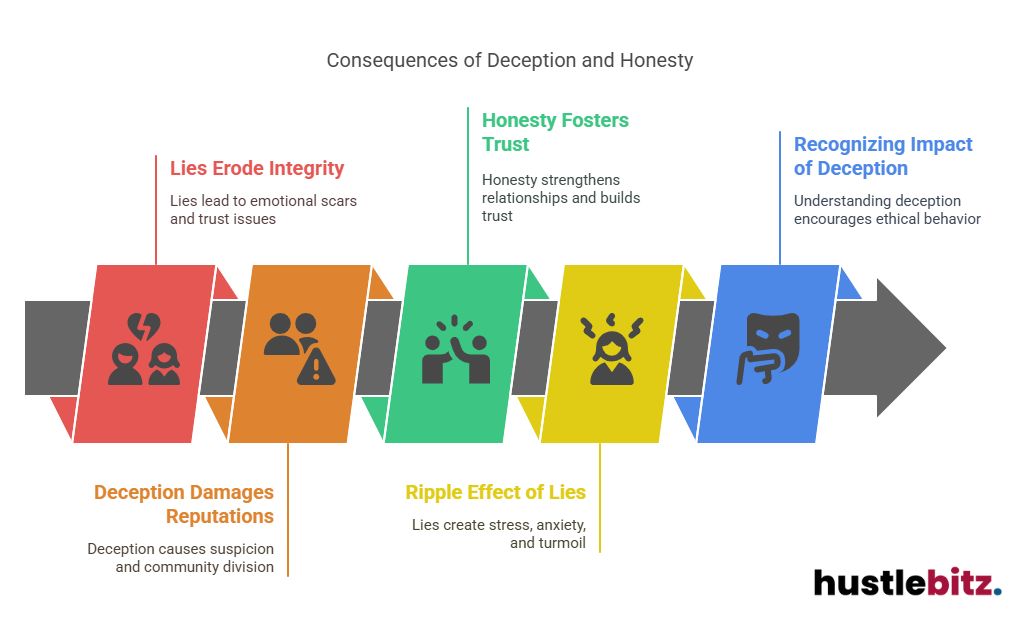Deception’s impact extends deeply into our emotional and psychological well-being, causing substantial harm to trust, integrity, and the essence of relationships. Quotes reflecting on lies, such as “A single lie discovered is enough to create doubt in every truth expressed” and “The trust of the innocent is the liar’s most useful tool,” underscore the profound consequences of dishonesty. Lies erode personal integrity, strain relationships, and leave enduring emotional scars. Rebuilding trust after betrayal is a challenging journey that requires time, transparency, and commitment. Understanding these dynamics fosters a deeper appreciation for the ethics of honesty and the severe repercussions of deceit.
Key Takeaways
- Lies erode personal integrity, causing emotional scars and long-term trust issues.
- Deception damages reputations, leading to widespread suspicion and community division.
- Honesty, though uncomfortable at times, fosters trust and strengthens relationships.
- The ripple effect of lies creates stress, anxiety, and turmoil in individuals and communities.
- Recognizing the deep impact of deception encourages ethical behavior and accountability.

Trust and Betrayal

Trust and betrayal are intrinsically linked, often manifesting in the aftermath of deceit. The collapse of trust is a profound consequence of betrayal, creating a chasm that can be challenging to bridge. Trust rebuilding is a meticulous process, requiring time, effort, and a commitment to honesty. The importance of honesty cannot be overstated; it serves as the cornerstone upon which new foundations of trust must be laid. Without it, any attempt at betrayal recovery is likely to falter.
Deception awareness is a crucial element in this journey. Recognizing the signs of deceit and understanding its implications can help individuals and relationships navigate the complex terrain of betrayal. Awareness fosters a sense of vigilance, reducing the likelihood of future betrayals and enabling more informed decisions about whom to trust.
The forgiveness journey is another pivotal aspect of recovering from betrayal. Forgiveness does not imply forgetting or excusing the transgression; rather, it is about releasing the burden of resentment and finding a path forward. This journey is deeply personal and varies widely from person to person. It often requires introspection, empathy, and sometimes professional guidance to achieve.
Rebuilding trust after betrayal is not a linear path. It involves setbacks and progress, moments of doubt, and glimpses of hope. The importance of open communication throughout this process cannot be ignored. Both parties must engage in honest dialogue, expressing their feelings and expectations transparently. This level of openness facilitates a deeper understanding and lays the groundwork for a renewed sense of trust.
The Ripple Effect

When a lie is told, its impact extends far beyond the initial act of deception, creating a ripple effect that can alter relationships, communities, and personal integrity. The dynamics of deception are intricate, often initiating a chain reaction of emotional consequences and integrity challenges. Lies undermine honesty principles, making trust restoration a complex and arduous process.
Understanding the ripple effect of a lie requires examining the multifaceted consequences it engenders. At the personal level, lies can erode self-respect and compromise moral values. Interpersonally, deception can damage reputations and breed suspicion, creating an environment where trust is scarce. In communities, the spread of falsehoods can lead to widespread misinformation, fostering division and conflict.
| Aspect | Impact |
| Personal Integrity | Erodes self-respect, challenges moral values |
| Relationships | Damages reputations, breeds suspicion |
| Communities | Spreads misinformation, fosters division |
| Emotional Health | Causes stress, anxiety, and emotional turmoil |
| Professional Trust | Undermines workplace cohesion and cooperation |
The emotional consequences of lies are profound, often causing stress, anxiety, and emotional turmoil. People who are deceived may experience feelings of betrayal and loss, which can be difficult to overcome. Integrity challenges arise when individuals must confront the reality of their dishonesty and the harm it has caused.
Restoring trust after deception is a delicate process. It requires consistent adherence to honesty principles and a genuine commitment to transparency. Trust restoration involves open communication, accountability, and the rebuilding of credibility over time.
The Cost of Dishonesty

The cost of dishonesty is often encapsulated in poignant quotes that highlight the profound impact of lies on personal integrity, relationships, and social cohesion. Quotes about dishonesty serve as reminders of the costly consequences that arise when truth is compromised. They underscore the importance of maintaining integrity and the long-term benefits of honesty.
Consider these quotes to reflect on the cost of dishonesty:
- “A single lie discovered is enough to create doubt in every truth expressed.” — Unknown
This quote highlights how a single act of dishonesty can erode trust, making it difficult to believe even the truths that follow. Trust rebuilding becomes a monumental task once doubt has been sown. - “Honesty is the first chapter in the book of wisdom.” — Thomas Jefferson
Jefferson’s words emphasize the foundational role of honesty in developing wisdom and moral integrity. Without honesty, the growth of true wisdom is stunted. - “He who permits himself to tell a lie once, finds it much easier to do it a second and third time, till at length it becomes habitual.” — Thomas Jefferson
This quote warns against the slippery slope of dishonesty. Once a lie becomes habitual, the lines of moral dilemmas blur, leading to an erosion of personal integrity. - “In the end, the truth will come out, but in the meantime, lies can destroy everything.” — Unknown
This quote speaks to the immediate and destructive impact of dishonesty. Lies can dismantle relationships and social cohesion long before the truth is revealed, causing irreparable harm.
These quotes serve as powerful reminders of the integrity importance in our lives. They illustrate that while dishonesty may seem advantageous in the short term, the honesty benefits far outweigh the temporary gains when considering the long-term implications on trust and personal relationships.
The Impact of Betrayal
Amidst the complexities of human relationships, betrayal stands out as one of the most devastating experiences one can endure. The emotional scars left by betrayal are often deep and lasting, challenging the very core of trust and honesty that form the foundation of any meaningful relationship.
As we delve into quotes about the impact of betrayal, it becomes evident that betrayal consequences resonate profoundly within the human psyche, often necessitating a long and arduous journey towards betrayal recovery.
One poignant quote by F. Scott Fitzgerald captures this sentiment well: “I was within and without, simultaneously enchanted and repelled by the inexhaustible variety of life.” This duality reflects the tumultuous emotions that arise when someone close betrays us, leaving us to grapple with conflicting feelings of love and hurt.
Another compelling quote by Mahatma Gandhi states, “The moment there is suspicion about a person’s motives, everything he does becomes tainted.” This underscores how betrayal can fundamentally alter our perception of others, making trust rebuilding an uphill battle. Once doubt creeps in, the path to restoring a relationship to its former state is fraught with challenges.
Helen Keller’s words, “Walking with a friend in the dark is better than walking alone in the light,” remind us of the importance of loyalty and the deep void left when it is broken. Betrayal strains the bonds of closeness, emphasizing the necessity of an honesty foundation in maintaining strong, resilient relationships.
Quotes About Lies That Make You Reflect
While betrayal leaves deep emotional scars, lies play a pivotal role in eroding trust long before betrayal is fully realized. Lies, both big and small, set the stage for a myriad of negative outcomes that challenge our understanding of truth vs. lies, and highlight the importance of honesty.
To reflect on the deception consequences and the value of integrity, it is insightful to consider poignant quotes that encapsulate the essence of these moral dilemmas.
- “The truth may hurt for a little while, but a lie hurts forever.” – The importance of honesty is highlighted here, as temporary discomfort from truth is far less damaging than the enduring pain of deceit.
- “Integrity is telling myself the truth. And honesty is telling the truth to other people.” – This quote by Spencer Johnson points to the core of integrity value, depicting that self-integrity is foundational to honesty in external relationships.
- “Lies are like scars on the soul. They destroy you.” – This powerful metaphor brings to light the deep, often unseen, harm that lies inflict on both the deceiver and the deceived.
These quotes provide a profound reflection on the interplay between truth vs. lies, and the far-reaching consequences of deception.
They serve as a reminder of the critical importance of honesty and the integrity value in building and maintaining trust. Reflecting on these moral dilemmas encourages a deeper appreciation for truth and the ethical standards that guide human interactions.
Final Thoughts
Deception’s impact is profound, touching both the personal and collective fabric of trust and integrity. The consequences of dishonesty ripple far beyond the moment of the lie, leaving scars that challenge relationships and create emotional turmoil. By reflecting on quotes about lies and betrayal, we are reminded of the importance of honesty and the value of trust. Healing from the damage caused by lies requires time, commitment, and a return to ethical principles that uphold integrity. Ultimately, fostering honesty in our interactions builds stronger connections and paves the way for healthier, more transparent relationships. Embracing truth, even when difficult, strengthens our personal values and cultivates a sense of accountability that resonates beyond ourselves.




